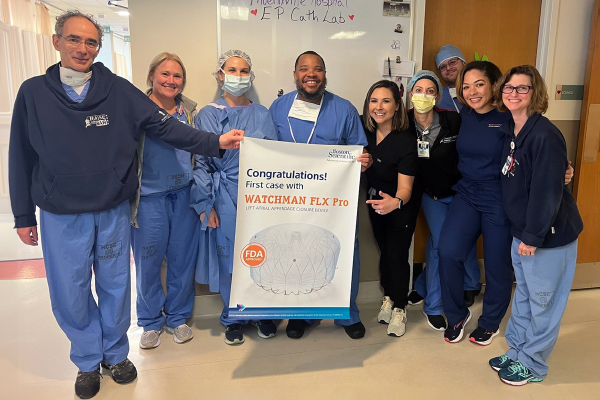
Vadim A Levin, MD performed Phoenixville Hospital’s first patient implant of the new WATCHMAN FLX™ Pro Left Atrial Appendage Closure (LAAC) Device. The hospital is one of the first in the Philadelphia region to offer this latest LAAC technology designed to reduce stroke risk and serve as an alternative to the lifelong use of blood thinners for people with atrial fibrillation not caused by a heart valve problem (also known as non-valvular AF or NVAF).
Built upon the proven safety and procedural performance of the WATCHMAN FLX™ LAAC Device, the WATCHMAN FLX Pro device features a permanent polymer coating (HEMOCOAT™ technology) that is designed to reduce the risk of device-related thrombus, visualization markers for enhanced placement, and a broader size matrix to treat a wider range of patients.
May is Stroke Awareness Month, which serves as a timely reminder of the increased risk of stroke among people living with Atrial Fibrillation (AF). An estimated seven million Americans are affected by AF – an irregular heartbeat that can feel like a quivering heart. People with AF have a five-times greater risk of stroke than those with normal heart rhythms.
The WATCHMAN FLX Pro device closes off an area of the heart called the left atrial appendage (LAA) to keep harmful blood clots that can form in the LAA from entering the bloodstream and potentially causing a stroke. By closing off the LAA, the risk of stroke may be reduced; over time, patients may be able to stop taking their blood thinners. The latest technology is enhanced with a non-drug-eluting coating designed to lower the risk of device-related thrombus and enable faster, controlled healing and endothelization of the device surface. It is also available in a larger size to treat patients with larger LAA anatomies.
“Building upon the well-established WATCHMAN technology, the WATCHMAN FLX™ Pro device is the latest-generation device designed to reduce stroke risk in patients with non-valvular atrial fibrillation (NVAF) who need an alternative to oral anticoagulation therapy,” said Vadim Levin, MD, Tower Health Medical Group Electrophysiologist. “I’m proud to have performed the implant of this device technology at Phoenixville Hospital, as it offers another patient a potentially life-changing stroke risk treatment and will allow us to treat a broad range of patients thanks to the expanded size matrix.”
WATCHMAN technology has been implanted to treat more than 300,000 patients worldwide and is done during a one-time procedure. This permanent device does not have to be replaced and cannot be seen outside the body. The procedure is done under general anesthesia and takes about an hour. Patients commonly stay in the hospital overnight and leave the next day.
About Phoenixville Hospital
Located in Phoenixville, Pa., and a member of Tower Health, Phoenixville Hospital is a 144-bed facility that provides comprehensive medical services through emergency room visits, inpatient admissions, outpatient procedures, and community outreach programs. Phoenixville Hospital’s services include an award-winning cardiovascular program, a fully accredited cancer center, a NAPBC-accredited breast health center, a Top 10% in the Nation acute inpatient rehabilitation center, and a large robotic surgery program. Phoenixville Hospital is accredited by The Joint Commission and has been recognized for its quality outcomes and clinical expertise across services lines that include advanced joint replacement surgery, advanced heart failure care, and the designation as a Primary Stroke Center. For more information, visit towerhealth.org.
